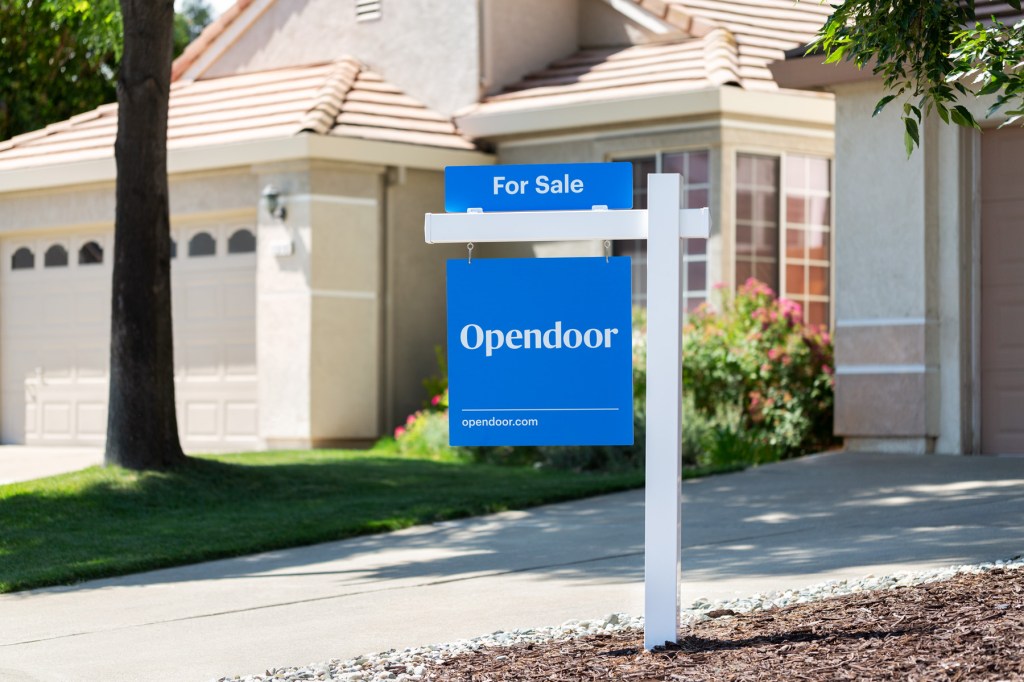
The sharpness of the current housing market slowdown has taken many by surprise, including economists, real estate agents and mortgage professionals. After losing money on 42% of its transactions in August, according to research from YipitData, it appears that Opendoor can also be added to that list.
For the first time ever, Opendoor’s buy-to-sale premium, also known as the difference between the price it buys properties at and the price it sells them for, dipped below 1% in August. In fact, it sank below 0%. Earlier this year it had hit a peak of 12%.
“For the first time in its existence, Opendoor is entering territory, where, in aggregate, it is selling homes for less than their purchase price,” Mike DelPrete, an industry analyst, wrote in a post.
However, Tyler Okland of Datadoor.io, an analytics company that collects data on residential real estate and proptech companies, does not believe the situation is as bad as the headlines have made out.
“The margin for Opendoor is really its buy-to-sell premium, plus their 5% liquidity premium fee and that 42% number is not including the 5% fee, which is the largest part of their margin,” Okland said. “So if you actually look at all August home sales by Opendoor, they lost money on only 23.8% of sales, so they are doing better than the headlines say, but you also don’t want a company to be losing money on a quarter of their sales, so there is clearly something wrong.”
While the situation is somewhat reminiscent of the Zillow Offers debacle of last fall, industry experts note a wide variety of different circumstances that contributed to the iBuyer’s August struggles.
“They are trying to buy at a price and sell at a higher price and make a profit on the trade,” Steve Murray, the president and co-founder of RealTrends Consulting, said. “If the market is trending up or moving strongly up, everything works pretty well, but when the market turns as it started doing back in April and prices start softening, it is a huge gamble. They are trying to buy into markets where no one knows where the prices will be in 60 days.”
Okland agrees: “I think Opendoors issues go back to what happened in late summer. In June, demand for homebuying just fell through the floor as mortgage rates rocketed up. I think despite the fact that the company was projecting there to be a housing decline in the second half of the year, they were not projecting it to be as deep and fast as it actually was.”
With the Federal Reserve raising interest rates by 75 basis points on Wednesday, a number of experts believe that mortgage rates will also continue to increase, further slowing buyer demand as consumers lose even more purchase power.
This has forced Opendoor to rethink its approach.
“The most successful companies in residential real estate who have ever navigated any cycle have capitalized on dislocations,” Okland said. “On the one hand Opendoor has a lot of inventory. What it needs to do [is] sell off all the inventory and get rid of all the inventory it feels like it mis-bought at the top of the market and at the end of the summer. Then it also needs to purchase more homes at higher spreads, and a lot of them, and then re-list those homes at higher margins, so its forward listing margins can improve.”
As Opendoor attempts to offload some of its inventory, DelPrete noted that the iBuyer has been cutting listing prices and offering buyers mortgage rate buy-down funds. In addition, the firm has also offered buyers’ brokers a one-time $3,500 commission bonus.
For its part, Opendoor remains confident that it will successfully be able to navigate this period of market volitility.
“We provided third quarter guidance in our last earnings to reflect lower than normal transaction volume and home price appreciation, as well as longer than normal hold times for our inventory associated with the most rapid change in residential real estate fundamentals in 40 years,” an Opendoor spokesperson wrote in an email. “We have moved quickly and decisively to prioritize inventory health and risk management. Our strong balance sheet combined with our 8 years of experience managing through up and down real estate markets across more than 50 metro areas enable us to honor our customer contracts at a time when our customers need certainty the most. We continue to build the platform that will transform how homes are transacted for decades to come.”
Despite the firm’s current struggles and those it is likely to face in the future, DelPrete believes Opendoor will not face the same fate as Zillow Offers.
“Zillow experienced a system-wide iBuying failure and exited because it was unwilling to accept the risks to its entire business going forward,” DelPrete wrote. “Opendoor, built from the ground up as an iBuyer and willing to accept those same risks, is vigorously managing the current situation.”
Murray added: “The Opendoor model is not meant to sit and hold listings. They have to turn them for a profit to generate revenue and grow the company. They launched in a steady to up market and now they are finding out what a market going the other way is like. With the market’s uncertainty their current situation doesn’t surprise me. I think they are going to have more trouble in the months to come, but I think they will certainly survive, they just might not live up to their dreams of being a huge company with huge market capitalization.”



